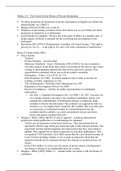Resume
Summary Media Law Notes - The Action for the Misuse of Private Information
- Cours
- Établissement
Includes: - Basis of Claims before HRA - Relationship between Common Law and Art 8 - Relevant English Cases - Relevant Cases – Sexual Conduct - Higher Awards of Damages - Cases involving Children - Injunctions in Criminal/ Investigations/ Proceedings/ Rehabilitation - ECtHR Cases
[Montrer plus]



